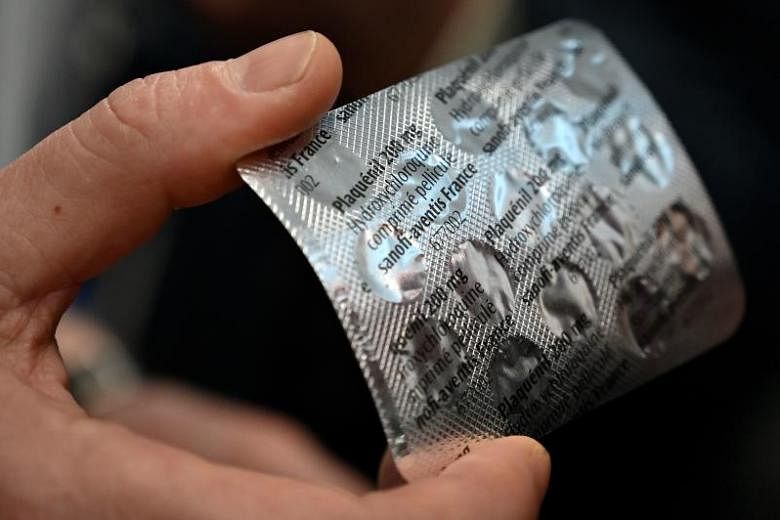WASHINGTON (REUTERS) - US President Donald Trump on Thursday (March 19) called on US health regulators to expedite potential therapies aimed at treating Covid-19 amid the fast-spreading coronavirus outbreak, saying it could lead to a breakthrough while a vaccine is still under development.
Trump, speaking at a news conference, pointed to efforts on Gilead Sciences Inc's experimental antiviral drug Remdesivir and the generic antimalarial drug hydroxychloroquine, saying he had called on the US Food and Drug Administration (FDA) to streamline its regulatory approval process.
"We have to remove every barrier," Trump said.
Trials on potential coronavirus therapies are already in the works, and it was unclear how Trump's call for faster experimental testing process could further expedite an effective treatment.
"It could be a game changer or maybe not," Trump told reporters.
FDA commissioner Stephen Hahn said his agency was working quickly to examine all possibilities.
"In the short term, we're looking at drugs that are already approved for other indications," Hahn said.
A 1,500-person trial, led by the University of Minnesota, began this week to see whether malaria treatment hydroxychloroquine could prevent or reduce the severity of Covid-19. Two other trials are studying the blood pressure drug losartan as a possible treatment for the disease.
The malaria drug, also being tested in China, Australia and France, was touted earlier this week by Tesla chief executive Elon Musk, who recovered from malaria in 2000 after taking the medication.
Besides having a direct antiviral effect, hydroxychloroquine suppresses the production and release of proteins involved in the inflammatory complications of several viral diseases.
"We are trying to leverage the science to see if we can do something in addition to minimising contacts," said Dr Jakub Tolar, dean of the University of Minnesota Medical School and vice-president for clinical affairs. "Results are likely in weeks, not months."
Most people infected with the new coronavirus develop only mild flu-like symptoms, but around 20 per cent can have more severe disease that can lead to pneumonia requiring hospitalisation.
The fast-spreading virus, which emerged in China in December and is now in more than 150 countries, has infected more than 214,000 and killed over 8,700 people worldwide, including at least 145 in the United States. Experts say it could take a year or more to have a preventive vaccine ready, so effective treatments are desperately needed.
A French team on Tuesday (March 17) said initial results from a 24-patient trial of hydroxychloroquine showed that 25 per cent of patients given the drug still carried the coronavirus after six days, compared with 90 per cent of patients given a placebo.
Dr Tolar said he bought 1,500 doses of hydroxychloroquine for a "laughable" amount of money.
"We don't need a multi-billion-dollar investment. It is part of the beauty of this approach," he said.
But he and others cautioned that people should not be using any prescription drugs without medical oversight.
"These treatments should be used only in hospitals by critical care specialists," said Dr Russel Buhr, critical care pulmonologist at the University of California, Los Angeles.
Hypertension drug
Also this week, the University of Minnesota launched two trials testing losartan - one to measure whether the hypertension drug reduces the risk of organ failure for Covid-19 patients who have been hospitalised, and another looking at whether the drug can limit the need for hospitalisations.
Losartan is an angiotensin receptor 1 (AT1R) blocker, which researchers say could play a role in blocking an enzyme used by the virus to bind to cells.
Pharmaceutical companies are also working to develop treatments for Covid-19, including Gilead Sciences Inc's experimental antiviral drug remdesivir, which is given to hospitalised patients via intravenous infusion over several days.
The New England Journal of Medicine earlier this month described how the drug was successfully used on the first patient infected by the new coronavirus in the US.
Results from a remdesivir trial in China could come early next month, while Gilead has begun two international trials of the drug that previously failed as a potential Ebola treatment.
And the National Institutes of Health last month began testing it on patients in a US trial.
"We are focusing on high risk patients," said Dr Andre Kalil, infectious disease specialist at the University of Nebraska Medical Centre and the US trial's lead investigator.
"Our hope is that remdesivir will show that patients will be improving faster."
Companies including Regeneron Pharmaceuticals Inc, Eli Lilly and Co and Takeda Pharmaceutical Co have begun to develop coronavirus treatment candidates, but human testing of their drugs has not yet started.
Anti-inflammatory drugs, like Regeneron's Kevzara and Roche Holding AG's Actemra, have been used to treat the lung inflammation caused by Covid-19.
But in a disappointment, Chinese investigators reported this week that Kaletra, a combination HIV drug sold by AbbVie , failed to improve outcomes for seriously ill Covid-19 patients.











